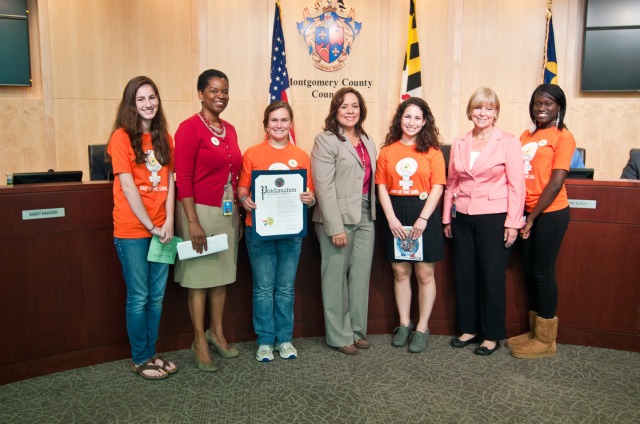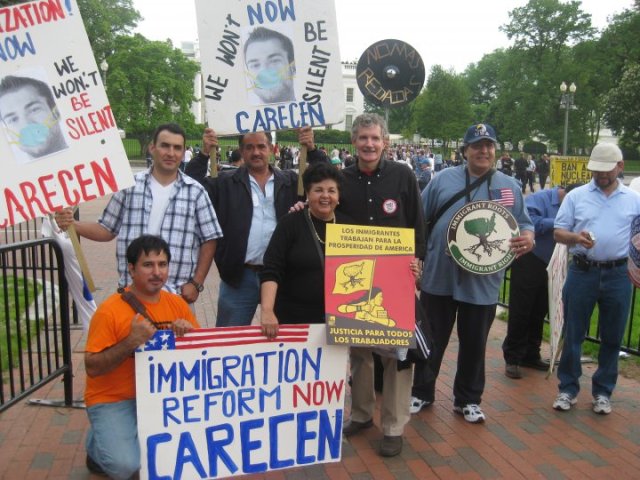At Language ETC, we often say we’re helping immigrants learn English so they can participate fully in US society and civic life. What does that really mean?
It may mean something as basic as joining a neighborhood committee, writing to a city council member, or going to a PTA meeting. But it can mean much more — becoming a naturalized US citizen, voting, and, for a small but growing number, running for public office.
An article in the Washington Post on Friday, November 3, 2011, highlighted foreign-born residents of our region who are doing just that. In Maryland and Virginia, and to a lesser extent in DC, they’re running for office and winning seats as school board and county board members, state legislators, and even — in the case of Falls Church, Virginia — mayor.

Nancy Navarro (center), a Montgomery County councilwoman, pictured with two Council colleagues and four students on Montgomery County’s “Day of the Girl,” September 21, 2011.
“In D.C. Region, More Immigrants Seeking Public Office,” by Post reporter Pamela Constable, explains:
Their journeys began in places as disparate as Colombia and Pakistan. They arrived in the United States speaking Hindi, Korean or Spanish. They worked their way up through engineering school or accounting jobs, keeping their heads down and their names out of the news.
Now, a small but growing number of foreign-born residents in the greater Washington region — home to more than 1 million immigrants from every corner of the globe — are coming out of their cocoons to enter electoral races and public office.
Immigrants elected to state and local office span the political spectrum, from liberal to conservative. Some, though not all, are outspoken in support of issues important to immigrants. Maryland state delegate Ana Sol Gutiérrez, born in El Salvador, is the first Latina elected to the Maryland General Assembly, where she represents portions of Montgomery County. She has been a strong voice on education equity, affordable housing, and a living wage.

Victor R. Ramírez, who grew up in Prince George’s County, is Maryland’s first Latino state senator. He supports the state’s Dream Act, saying, “We want the strongest and most educated work force possible.”
Earlier this year, Montgomery County Council member Nancy Navarro, born in Venezuela, and Maryland state senator Victor Ramírez, born in El Salvador, worked with other Maryland officeholders and community groups to pass the state’s “Dream Act” — legislation granting all Maryland residents in-state tuition to Maryland universities, regardless of their immigration status. Arlington School Board member Emma Violand-Sánchez, who was born in Bolivia and is a former ESL educator, founded the Dream Project, Inc., which awards scholarships to undocumented students.

Maryland state delegate Ana Sol Gutiérrez, center, with friends from the Central American Resource Center (CARECEN), at an immigrant rights demonstration in Washington.
While not all foreign-born officeholders publicly identify with immigrant rights, most are at least sensitive to immigrant concerns. Ilryong Moon, a lawyer from Korea who serves on the Fairfax School Board, told the Post,
“When Hispanic parents don’t show up at school meetings, I understand them. . . . My parents never came to my school, either. They worked too many jobs, they spoke almost no English and they came from a culture where you never approached officials. I may not speak good Spanish, but I get it.”

Ilryong Moon, a lawyer born in Korea, is a school board member in Fairfax County. When he arrived in the US in 1974, he says, he struggled with English.
Many immigrants who run for office came to the United States as children or teenagers and grew up here. Still, like all immigrants, they frequently have to contend with stereotypes of “otherness” and questions about their loyalties. And all face the ubiquitous ethnic put-down:
Walter Tejada, 53, a Salvadoran immigrant running for reelection after eight years on the Arlington County Board, is a political veteran who can mingle easily at a raucous rally or a formal gala. Yet not long ago, he recounted, he was wearing a tuxedo at a fundraiser when a white woman handed him her empty glass and brushed past, assuming he was a waiter.

Arlington County Board member Walter Tejada (right), who came to the United States from El Salvador as a teenager, has emphasized Arlington’s diversity. He runs under the bilingual slogan “For all of Arlington / Para todo Arlington.”
As they win recognition for their public service, immigrant officeholders may see stereotypes begin to fade. Shahid Malik, a Pakistani-born businessman running for Fairfax County supervisor, described to the Post how he connects with voters:
“I talk about my technical experience, my community service and my four kids who went through the county schools. . . . I heard that someone called me ‘that Muslim guy running from that mosque,’ but no one has said anything to my face.”
When he knocks on voters’ doors, he said, “most wish me good luck.”



